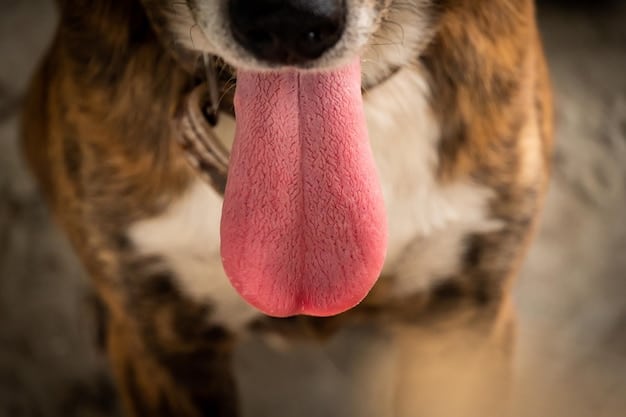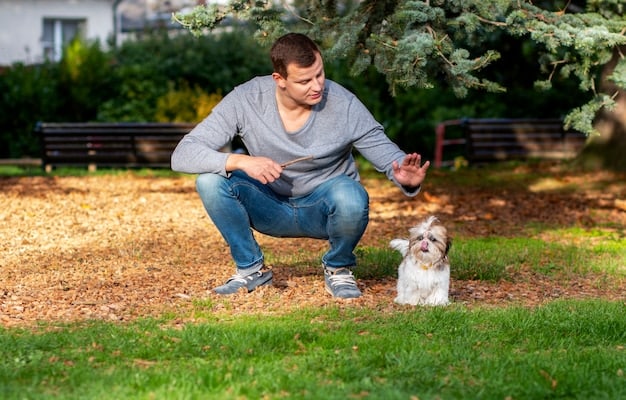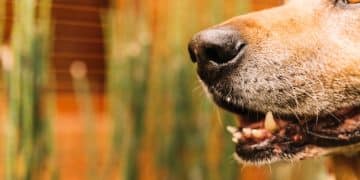Why Do Dogs Eat Grass? Understanding Canine Grass-Eating Habits

Why do dogs eat grass? This common canine behavior is often attributed to a variety of reasons, including dietary deficiencies, gastrointestinal upset, or simply curiosity and taste, although understanding the definitive cause can require veterinary insight.
Seeing your dog munch on grass might seem odd, but it’s a surprisingly common behavior. But why do dogs eat grass? Is it a sign of illness, a dietary need, or just a quirky habit? Let’s explore the potential reasons behind this grassy indulgence and what you should consider.
Understanding Why Dogs Eat Grass
It’s a scene familiar to many dog owners: your furry friend happily grazing on the lawn. But what prompts this behavior? While there are several theories, a single definitive answer remains elusive. Let’s delve into the most common explanations and shed some light on this canine conundrum.
It’s important to note that not all grass-eating is cause for alarm. Many dogs do it occasionally without any apparent ill effects. However, frequent or excessive grass consumption could indicate an underlying issue that warrants further investigation.

Possible Reasons for Grass Eating
Several theories attempt to explain why dogs indulge in this grassy habit. Some suggest it’s related to their diet, while others believe it’s a way to soothe an upset stomach. Here are some of the most widely accepted explanations:
- Dietary Deficiencies: Some believe dogs eat grass to compensate for a lack of essential nutrients in their diet, such as fiber.
- Digestive Upset: Grass may act as a natural emetic, helping dogs to vomit and relieve nausea or indigestion.
- Instinctual Behavior: Wild canids often consume grass and other vegetation as part of their diet, and this instinct may persist in domesticated dogs.
- Boredom or Habit: Sometimes, dogs simply eat grass out of boredom or because they enjoy the taste and texture.
Determining the exact reason why your dog eats grass can be tricky, as multiple factors may be at play. Monitoring your dog’s behavior and consulting with a veterinarian can help identify any underlying health concerns.
In conclusion, while the definitive reason behind grass-eating remains a subject of debate, several factors, including dietary needs, digestive issues, and instinctual drives, could contribute to this common canine behavior.
Is Eating Grass Harmful to Dogs?
While the act of eating grass is generally considered harmless for dogs, there are certain risks to be aware of. Understanding these potential dangers can help you protect your furry friend and minimize any negative consequences.
It’s essential to assess the environment where your dog is grazing. Are there any potential hazards lurking in the grass? Let’s examine some of the key concerns:
Potential Risks Associated with Grass Eating
While seemingly innocuous, grass can harbor a variety of potential dangers that dog owners should be mindful of. Here’s a closer look at some of the risks:
- Pesticides and Herbicides: Lawns treated with chemicals can pose a serious threat to dogs if ingested.
- Parasites: Grass can be contaminated with parasite eggs or larvae, leading to infections.
- Toxic Plants: Certain types of grass or weeds may be toxic to dogs, causing a range of symptoms.
- Foreign Objects: Dogs may inadvertently swallow foreign objects, such as rocks or twigs, while eating grass.
To mitigate these risks, it’s crucial to ensure that your dog is eating grass from a safe and uncontaminated source. Avoid areas treated with chemicals and be vigilant about potential hazards in the environment.

Ultimately, while grass eating is often harmless, taking precautions to minimize potential risks is essential. By being aware of the environment and consulting with a veterinarian, you can keep your dog safe and healthy.
When to Worry About Your Dog’s Grass-Eating Habit
Occasional grass eating is usually nothing to worry about, but there are certain signs and symptoms that should prompt a visit to the veterinarian. Recognizing these red flags can help you identify potential health issues and seek timely treatment.
It’s important to pay close attention to your dog’s behavior and overall health. Are they exhibiting any other symptoms besides grass eating? Let’s explore some of the key warning signs:
Red Flags to Watch For
While occasional grass eating is often harmless, certain signs and symptoms should raise concern. Here are some red flags to watch out for:
- Frequent Vomiting: If your dog vomits frequently after eating grass, it could indicate an underlying gastrointestinal issue.
- Loss of Appetite: A sudden loss of appetite, coupled with grass eating, may signal a more serious health problem.
- Lethargy: If your dog seems unusually tired or weak, it’s essential to seek veterinary attention.
- Changes in Stool: Diarrhea, constipation, or blood in the stool can indicate a digestive problem that needs to be addressed.
If you notice any of these symptoms, it’s important to consult with a veterinarian as soon as possible. Early diagnosis and treatment can help prevent more serious complications.
Whether grass eating is a harmless habit or a sign of an underlying issue depends on various factors, including the frequency, associated symptoms, and overall health of your dog.”
The Role of Diet in Grass Consumption
Could your dog’s diet be influencing their grass-eating habit? Some experts believe that dietary deficiencies or imbalances may play a role in this behavior. Let’s investigate the connection between diet and grass consumption in dogs.
A balanced and nutritious diet is essential for your dog’s overall health and well-being. Could a lack of certain nutrients be driving your dog to seek out grass? Let’s consider some key points:
Dietary Considerations for Grass Eaters
A dog’s diet can significantly impact their behavior, including their propensity to eat grass. Here’s a closer look at some dietary considerations:
- Fiber Deficiency: Some dogs may eat grass to increase their fiber intake, particularly if they are fed a diet that is low in fiber.
- Nutrient Imbalance: An imbalance of essential nutrients, such as vitamins and minerals, could also contribute to grass eating.
- Poor-Quality Food: Low-quality dog food may lack the necessary nutrients to keep your dog healthy, leading them to seek out additional sources of nutrition, such as grass.
Consider consulting with a veterinarian or a certified canine nutritionist to ensure that your dog is receiving a balanced and nutritious diet. Addressing any dietary deficiencies may help reduce or eliminate their grass-eating habit.
It’s not just about what a dog eats, but also the quality and balance of their diet.”
Alternative Explanations for Eating Grass
Beyond dietary and digestive factors, there are other potential explanations for why dogs eat grass. Instinctual behavior, boredom, and even taste preferences could play a role. Let’s explore some of these alternative theories.
Sometimes, the simplest explanation is the most accurate. Could it be that your dog simply enjoys the taste or texture of grass? Let’s consider a few possibilities:
Other Theories on Grass Consumption
While dietary and digestive factors are often cited as reasons for grass eating, other theories suggest that instinct, boredom, or taste preferences could also be at play. Here’s a closer look.
Wild canids have been known to eat grass and other vegetation. It may be an instinctual thing to do based on their lineage.
- Instinct and Ancestry: Some believe that grass-eating is an instinctual behavior rooted in a dog’s evolutionary past.
- Boredom and Attention-Seeking: Dogs may eat grass out of boredom or as a way to get their owner’s attention.
- Taste and Texture: Some dogs simply enjoy the taste and texture of grass, much like humans enjoy certain types of food.
Ultimately, the reason why a dog eats grass is likely a combination of factors that vary from dog to dog. By considering all potential explanations, you can gain a better understanding of your furry friend’s behavior. As always, consult a vet if the habit becomes destructive or constant.
Whether it’s instinct, boredom, or a genuine appreciation for its taste, grass eating is a complex behavior with various potential drivers.”
How to Manage Your Dog’s Grass-Eating Habit
Whether you’re concerned about potential health risks or simply want to discourage the behavior, there are several strategies you can use to manage your dog’s grass-eating habit. Let’s explore some practical tips and techniques.
From dietary adjustments to environmental modifications, there are various approaches you can use to address your dog’s grass-eating behavior. Let’s consider some effective strategies:
Strategies to Stop Your Dog from Eating Grass
If you’re concerned about your dog’s grass-eating habit, there are several steps you can take to manage or discourage the behavior. Here are some effective strategies.
- Improve Diet: Consider switching to a higher-quality dog food or adding fiber supplements to improve your dog’s diet.
- Provide More Exercise: Ensure that your dog gets plenty of exercise and mental stimulation to prevent boredom.
- Supervise Outdoor Time: Keep a close eye on your dog when they’re outdoors and redirect their attention if they start eating grass.
- Create a Designated Grazing Area: If you’re comfortable with your dog eating grass, create a designated area where the grass is safe and free from chemicals.
By implementing these strategies, you can effectively manage your dog’s grass-eating habit and ensure their health and well-being.
The approach to grass eating management must be individualized to each dog, considering their specific needs and the underlying reasons for their behavior.”
| Key Point | Brief Description |
|---|---|
| 🌱 Dietary Needs | Grass may supplement fiber or nutrients lacking in their regular diet. |
| 🤢 Digestive Aid | Grass can induce vomiting, helping to relieve upset stomachs or nausea. |
| 🐾 Instinct | Eating grass can be an instinctive behavior inherited from their wild ancestors. |
| Boredom or Habit | Sometimes, dogs eat grass because they are bored or have developed a habit. |
Frequently Asked Questions
▼
Yes, it is quite common. Many dogs engage in this behavior at some point in their lives, and it’s often not a cause for concern unless it’s excessive or accompanied by other symptoms.
▼
Normally, no. The main concern is potential exposure to pesticides, herbicides, or parasites on the grass. Ensure the grass is from a safe, untreated area to minimize risks.
▼
There’s no set amount, but if your dog is eating grass daily or frequently vomiting after eating it, consult your vet. This could indicate an underlying health issue that needs attention.
▼
Possibly. Some dogs might eat grass to supplement missing nutrients like fiber. Reviewing and adjusting your dog’s diet with a vet’s help could reduce this behavior if nutritional deficits are the cause.
▼
Not necessarily, if it’s occasional and your dog seems fine. However, if you’re worried about potential risks or it becomes excessive, try managing their access and consulting with your veterinarian for further advice.
Conclusion
In conclusion, why do dogs eat grass? While the reasons behind this widespread behavior remain multifaceted and not fully understood, it’s generally considered normal unless it becomes excessive or is accompanied by signs of illness. Understanding the potential risks, monitoring your dog’s habits, and consulting with a veterinarian can help you ensure your furry friend stays happy and healthy.





